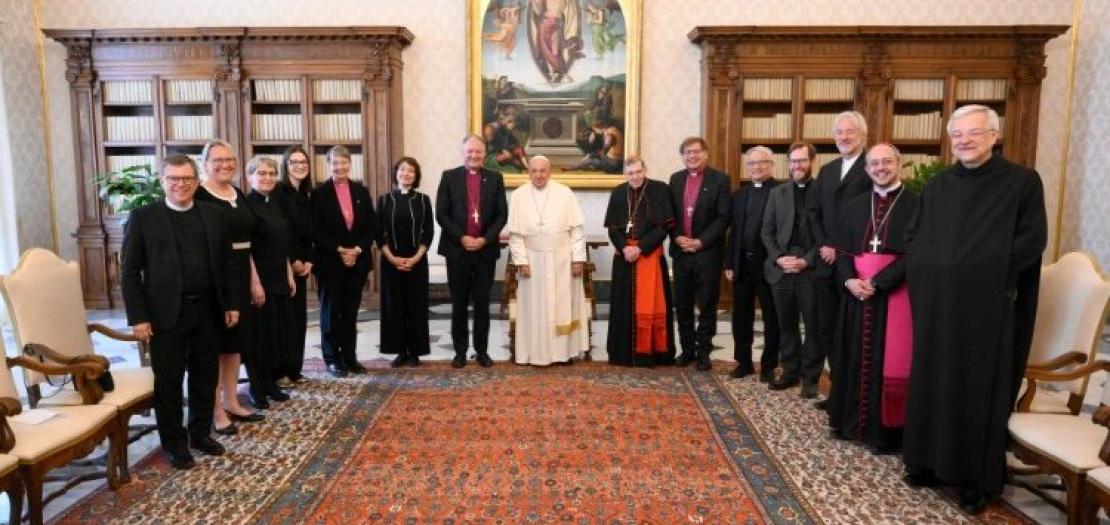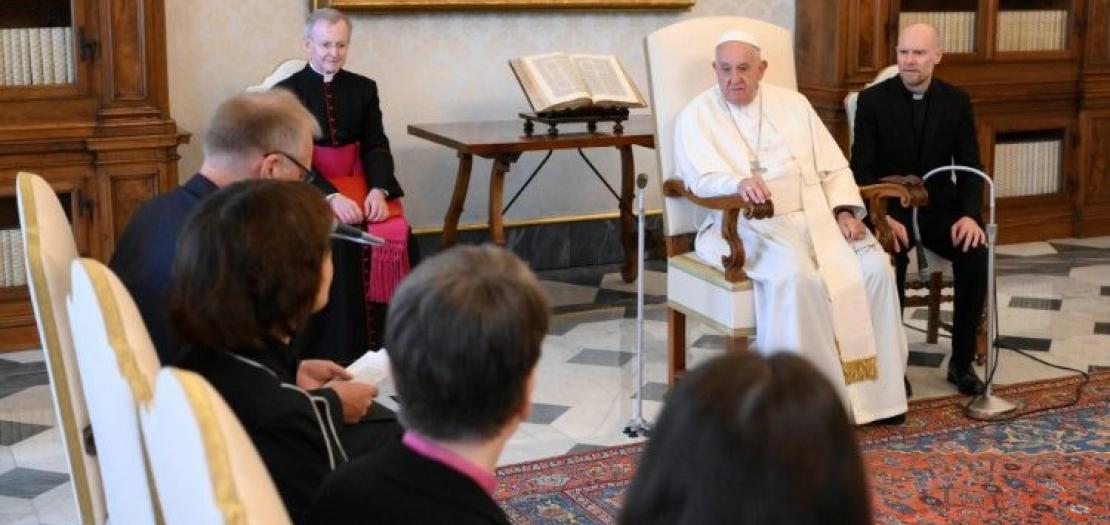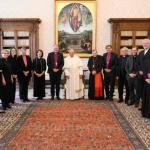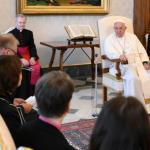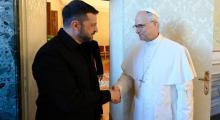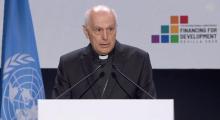Issued by the Catholic Center for Studies and Media - Jordan. Editor-in-chief Fr. Rif'at Bader - موقع أبونا abouna.org
Pope Francis welcomed a delegation of leaders from the Lutheran World Federation to the Vatican on Thursday, June 20, describing their visit as “an important gesture of ecumenical fraternity.”
Recalling an earlier meeting with Lutherans, in 2021, Pope Francis highlig ed the upcoming anniversary of the First Council of Nicea as “an ecumenical event.” The Nicene Creed “is an ecumenical bond that has its centre in Christ”, the Pope said, quoting the Common Word issued by LWF General Secretary, Reverend Doctor Anne Burghardt (who was present at Thursday’s encounter) and Cardinal Kurt Koch from the Dicastery for Promoting Christian Unity during the Federation’s recent General Assembly in Krakow.
“In this context,” he said, “you rightly recalled a beautiful sign of hope, which has a special place in the history of reconciliation between Catholics and Lutherans.”
Pope Francis then turned to the earlier Joint Declaration on the Doctrine of Justification, signed 25 years ago, in which Catholics and Lutherans agreed on the common goal of “confessing Christ in all things.”
“Jesus Christ is the heart of ecumenism,” the Pope said. “He is divine mercy incarnate, and our ecumenical mission is to bear witness to this.”
That Declaration is “another sign of hope in our history of reconciliation,” he said, as he invited Catholics and Lutherans to celebrate the anniversary of its signing “as a celebration of hope.”
Then, noting “our common spiritual origin” in “one baptism for the forgiveness of sins” Pope Francis called on Lutherans and Catholics to “confidently continue as pilgrims of hope” in the ongoing dialogue “of truth and charity.”
Concluding his remarks, the Holy Father recalled a story about Orthodox Bishop John Zizioulas, who would say, jokingly, that the union of Christians would be achieved only on the day of Judgment at the end of time.
“But in the meantime,” Pope Francis said still quoting the late Bishop, “we have to walk together: journeying together, praying together, and performing works of charity together.
Lutheran World Federation meets with Pope: Already ‘so much' in common
On Thursday, June 20, Pope Francis met with a delegation from the Lutheran World Federation, highlighting the ‘signs of hope’ on our common ecumenical journey.
Among those in attendance was the Rev Dr Anne Burghardt, the Federation’s General Secretary and an ordained pastor in the Estonian Evangelical Lutheran Church.
After the meeting, the Rev Burghardt stopped by for an interview in Vatican News’ offices, and discussed the state of Catholic-Lutheran relations today.
Burghardt began by noting that the Lutheran Church’s dialogue with the Catholic Church is its oldest, dating back to 1967, right after the Second Vatican Council.
There have been five rounds of official dialogue between Catholics and Lutherans so far, and, Burghardt said, the plan is for a sixth phase – focusing on ecclesiology and the understanding of ministry – to begin next year.
However, she stressed, there is “already so much we can celebrate together”. In particular, she mentioned the 1999 joint declaration on the doctrine of justification, which, she said, “solves one of the crucial issues that caused separation in the 16th century.”
Burghardt noted that next year will mark the beginning of the preparations for the 500th anniversary of the Augsburg Confession (or ‘Confessio Augustana’), a foundational statement of the Lutheran faith.
Published in 1530, it was originally intended to frame Lutheran theology in such a way that it would be acceptable to Roman Catholics.
Burghardt said that the LWF is hoping to “look at this confessional work through an ecumenical lens”, exploring together with the Catholic Church the “universal Christian understanding” it contains.
Asked about the rediscovery in recent scholarship of the ‘Catholic Luther’, Burghardt said that “it was never Luther's aim to create another Church.”
His aim, she said, was rather to reform the Church, and to “put the Gospel and the message of God's grace at the centre.”
“When I listened to Pope Francis this morning,” she added, “he said that Jesus Christ is the heart of ecumenism and he is Divine Mercy incarnate - this could easily have been said by Martin Luther back then.”
She noted that this, in her view, is the central contribution that Luther has made to Christianity as a whole: the impetus to “put Jesus Christ and the relevance of God's grace and mercy at the centre of our faith.”
As the interview drew to a close, Burghardt emphasised her “great joy” over the current state of good relations between churches today.
Sometimes we hear, she noted, that ecumenism is not moving fast enough – but it is very important to remember that only 100 years ago the situation was completely different
“It is very good to see that Christians are really coming closer together and are working together,” Burghardt said. “Joint voices are very much needed in the world today.”


